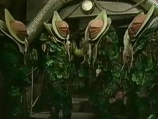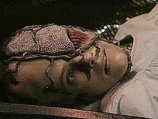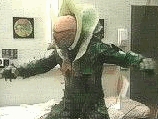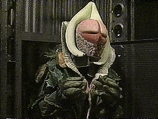 |
| The Vervoids |
|
 Name: Vervoids Name: Vervoids
 Format:
Television show Format:
Television show
 Time of Origin: Genetically engineered
on an unspecified world. Time of Origin: Genetically engineered
on an unspecified world.
 Appearances: "The
Trial of a Time Lord: Terror
of the Vervoids" Appearances: "The
Trial of a Time Lord: Terror
of the Vervoids"
 Doctors: Sixth
Doctor Doctors: Sixth
Doctor
 Companions: Melanie
Bush Companions: Melanie
Bush
 |
| Half-Vervoid |
|
 History: An artificially engineered species of
sentient plant, an interesting detail about The Doctor’s encounter
with the Vervoids is that he knew about it before it happened; The
Doctor initially learned about the Vervoids when he was on trial
for his life on the charge of interference in the affairs of the
universe, using the Matrix to look into his own future and find evidence
that would clear his name. History: An artificially engineered species of
sentient plant, an interesting detail about The Doctor’s encounter
with the Vervoids is that he knew about it before it happened; The
Doctor initially learned about the Vervoids when he was on trial
for his life on the charge of interference in the affairs of the
universe, using the Matrix to look into his own future and find evidence
that would clear his name.
 When
The Doctor faced the Vervoids, it was in the year 2986 on the galactic
liner Hyperion III, captained by Commodore Travers - a man who had
previously encountered The Doctor in an unreleased adventure (Although "Instruments
of Darkness" revealed that it had taken place while The Doctor
travelled with other future companion Evelyn Smythe) -, carrying
such diverse passengers as the science trio Professor Lasky and her
colleagues Bruchner and Doland, The Doctor being drawn to the Hyperion after the ship broadcast a distress signal from Hallett, a passenger
on the ship and an investigator that had prior experience of The
Doctor. When
The Doctor faced the Vervoids, it was in the year 2986 on the galactic
liner Hyperion III, captained by Commodore Travers - a man who had
previously encountered The Doctor in an unreleased adventure (Although "Instruments
of Darkness" revealed that it had taken place while The Doctor
travelled with other future companion Evelyn Smythe) -, carrying
such diverse passengers as the science trio Professor Lasky and her
colleagues Bruchner and Doland, The Doctor being drawn to the Hyperion after the ship broadcast a distress signal from Hallett, a passenger
on the ship and an investigator that had prior experience of The
Doctor.
 As
Hallett had discovered, Lasky and her colleagues had developed a
genetically -engineered form of sentient plant, known as the Vervoids,
with the intention that they would eventually replace robots as the
means of doing tasks that humans were currently incapable of. Unfortunately,
Lasky failed to take into account that, since all ‘animalkind’ -
as humans were referred to by the Vervoids - automatically ate plants
to survive, the Vervoids would be left with an instinctive hatred
of ‘animal-kind’ and a need to kill them for survival.
Although initially contained in the Hyperion hydroponics bay, the
Vervoids escaped when their pods were accidentally opened. As
Hallett had discovered, Lasky and her colleagues had developed a
genetically -engineered form of sentient plant, known as the Vervoids,
with the intention that they would eventually replace robots as the
means of doing tasks that humans were currently incapable of. Unfortunately,
Lasky failed to take into account that, since all ‘animalkind’ -
as humans were referred to by the Vervoids - automatically ate plants
to survive, the Vervoids would be left with an instinctive hatred
of ‘animal-kind’ and a need to kill them for survival.
Although initially contained in the Hyperion hydroponics bay, the
Vervoids escaped when their pods were accidentally opened.
 |
| A Vervoid |
|
 As the Vervoids roamed the Hyperion’s
air ducts, they began to kill the human passengers, collecting them in
their ‘lair’ to create a compost heap just as humans collected
dead plants, The Doctor gradually piecing together what he was dealing
with when examination of an Isolation Room that Lasky had been using
revealed that Ruth, another colleague, was mutating into a half-plant
life-form after being infected by a speck of Vervoid pollen through a
small cut in her thumb. Driven insane by fear of the Vervoids, Bruchner
attempted to steer the ship into a black hole to destroy them, but the
ship’s course was diverted thanks to two Mogarian passengers after
the bridge was infected with marsh gas - Mogarians being able to tolerate
the toxic gas - by Doland, his own insanity driving him to ‘save’ the
Vervoids in the belief that they could still be used for their original
purpose, only to be killed by the Vervoids after The Doctor realised
his true intentions. As the Vervoids roamed the Hyperion’s
air ducts, they began to kill the human passengers, collecting them in
their ‘lair’ to create a compost heap just as humans collected
dead plants, The Doctor gradually piecing together what he was dealing
with when examination of an Isolation Room that Lasky had been using
revealed that Ruth, another colleague, was mutating into a half-plant
life-form after being infected by a speck of Vervoid pollen through a
small cut in her thumb. Driven insane by fear of the Vervoids, Bruchner
attempted to steer the ship into a black hole to destroy them, but the
ship’s course was diverted thanks to two Mogarian passengers after
the bridge was infected with marsh gas - Mogarians being able to tolerate
the toxic gas - by Doland, his own insanity driving him to ‘save’ the
Vervoids in the belief that they could still be used for their original
purpose, only to be killed by the Vervoids after The Doctor realised
his true intentions.
 With
the Hyperion now on a direct course for Earth, The Doctor, Travers
and Lasky resolved to destroy the creatures, but were unable to develop
a herbicide as the Vervoids had destroyed the necessary chemicals. However,
upon examining the Hyperion’s other cargo of rare metals, The Doctor
learned that the ship was also carrying vionesium, a rare metal from
Mogar that released intense light and carbon dioxide when exposed to
oxygenated air. Having lured the Vervoids back to their lair by lowering
the lighting and heating in the rest of the ship, The Doctor used the
vionesium as ‘bombs’ against the Vervoids, the resulting
chemical release causing the Vervoids’ life cycle to accelerate
due to the intensity of the chemicals produced, leaving them to wither
and die. With
the Hyperion now on a direct course for Earth, The Doctor, Travers
and Lasky resolved to destroy the creatures, but were unable to develop
a herbicide as the Vervoids had destroyed the necessary chemicals. However,
upon examining the Hyperion’s other cargo of rare metals, The Doctor
learned that the ship was also carrying vionesium, a rare metal from
Mogar that released intense light and carbon dioxide when exposed to
oxygenated air. Having lured the Vervoids back to their lair by lowering
the lighting and heating in the rest of the ship, The Doctor used the
vionesium as ‘bombs’ against the Vervoids, the resulting
chemical release causing the Vervoids’ life cycle to accelerate
due to the intensity of the chemicals produced, leaving them to wither
and die.
 |
| A Vervoid |
|
 Although the crisis itself was resolved in a straightforward
manner, The Doctor’s use of it as evidence at his trial only
left him in further trouble with the court, the Valeyard - the court
prosecutor, later revealed to be The Doctor’s own dark side
- taking the opportunity to accuse The Doctor of violating Article
Seven and committing genocide against the Vervoids. Although The
Doctor recognised this accusation was essentially legitimate, he
argued that it couldn’t apply as the consequences of the Vervoids
surviving would have been the destruction of all life on Earth, the
Eighth Doctor - having come back in time to visit his former self
("The
Eight Doctors") - agreeing with his past self’s
dismissal of the charge on the grounds that the Vervoids were an
artificial creation rather than a naturally-evolved species and hence
Article Seven didn’t apply. Although the crisis itself was resolved in a straightforward
manner, The Doctor’s use of it as evidence at his trial only
left him in further trouble with the court, the Valeyard - the court
prosecutor, later revealed to be The Doctor’s own dark side
- taking the opportunity to accuse The Doctor of violating Article
Seven and committing genocide against the Vervoids. Although The
Doctor recognised this accusation was essentially legitimate, he
argued that it couldn’t apply as the consequences of the Vervoids
surviving would have been the destruction of all life on Earth, the
Eighth Doctor - having come back in time to visit his former self
("The
Eight Doctors") - agreeing with his past self’s
dismissal of the charge on the grounds that the Vervoids were an
artificial creation rather than a naturally-evolved species and hence
Article Seven didn’t apply.
 (Given that The Doctor had ‘advance warning’ of
the events of his confrontation with the Vervoids, it was never expressly
stated whether he simply allowed events to happen as they should
because he had to do so in order to prevent a paradox or if he slightly ‘edited’ his
memory of the confrontation after the trial was over so that he would
be aware of the essential details without knowing any specifics) (Given that The Doctor had ‘advance warning’ of
the events of his confrontation with the Vervoids, it was never expressly
stated whether he simply allowed events to happen as they should
because he had to do so in order to prevent a paradox or if he slightly ‘edited’ his
memory of the confrontation after the trial was over so that he would
be aware of the essential details without knowing any specifics) |
| |
|
|
|